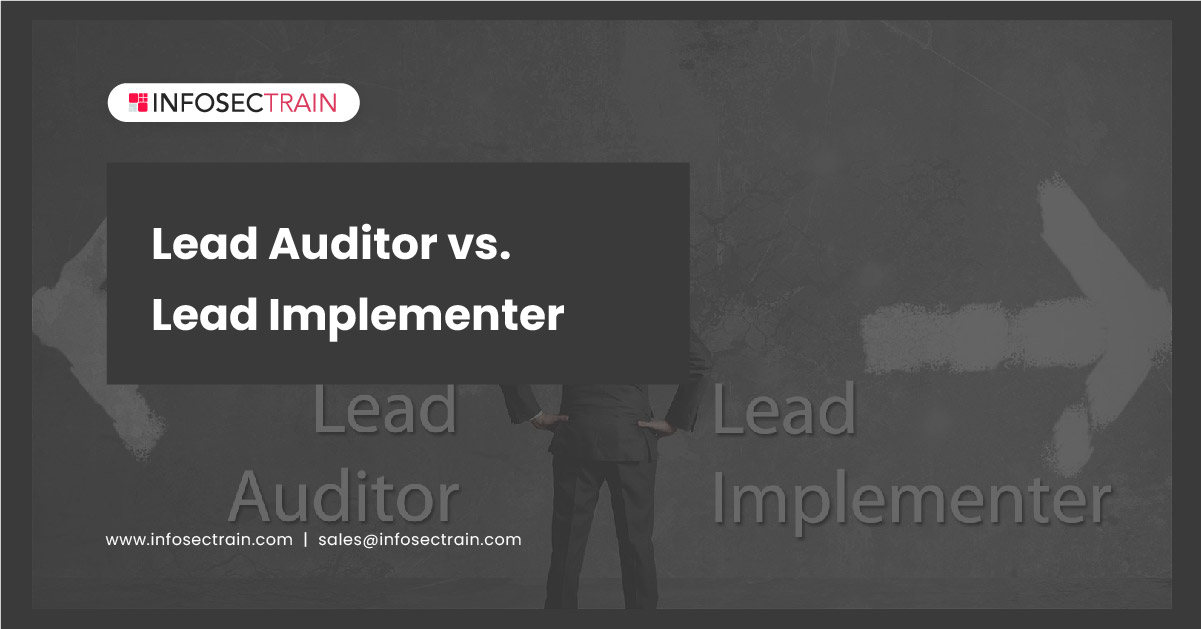Lead Auditor vs. Lead Implementer
Introduction
As we all know, information security threats and attacks are continuously increasing and evolving. Implementing and managing information security policies is the best practice to defend against them. Information security management must be a valuable part and suitable for organizations and society if they are to be safeguarded from the threats that come with the digital era.

Table of Contents
What is ISO?
What is a Lead Auditor?
What is a Lead Implementer?
Difference Between Lead Auditor and Lead Implementer
What is ISO?
ISO (International Organization for Standardization) is a non-governmental organization that oversees a global network of national standardization bodies. ISO creates guidelines for businesses to ensure that their products, services, and systems are high quality, safe, and efficient. Within the ISO, there are several series, one of which is ISO 27001, which deals with Information Security Management Systems (ISMS). ISO 27001 is a commercial security standard that is widely used around the world.
If you are new to ISO standards and can not decide between becoming a Lead Auditor and a Lead Implementer, this article will help you decide which option is best for your career growth.
In this blog, you’ll learn what a Lead Auditor and a Lead Implementer are and the differences between the Lead Auditor and the Lead Implementer.
What is a Lead Auditor?
A Lead Auditor is a person in charge of leading an organization’s audit team. The Lead Auditor is primarily concerned with auditing procedures. They will assess and check the effectiveness of the disciplinary action implemented by examining the corrective action plan and the outcomes, records, and other proof of activities accomplished. The role of a Lead Auditor is to examine whether the policies that have already been written are correct and whether they may be given nonconformity and also check the policies’ vulnerabilities. Lead Auditor enables you to undertake Ist, 2nd, and 3rd party audits.
Types of Audits
There are three types of audits for ISO management systems:
- First Party Audit: An internal audit is a first-party audit performed by the company’s employees. The goal is to make the deployment of standards more conformant and practical. The first-party audit will assist in the identification of potential issues that could result in customer compliance.
- Second Party Audit: A second-party audit is conducted by a supplier, customer, or contractor, usually against their proprietary requirements. When a corporation performs a second-party supplier audit, it validates that the provider is adhering to the contract terms. Depending on their needs, the customer can audit the entire agreement or only a piece of it.
- Third Party Audit: An external audit and independent body, such as a certification agency or regulators, performs a third-party audit against a recognized standard. Its goal is to assess a quality management system’s conformity with specific criteria to obtain certification. They lead the team using the strategies and processes they learned during their lead auditor training.
Lead Auditor Certification Course:
The Lead Auditor course covers all the ISO 27001 foundational concepts. This credential prepares participants to audit a management system and manage a team of auditors using established audit principles, processes, and techniques. And also prepare for how to conduct, close, and organize an ISO 27001 audit. This certification is especially valid for ISMS auditors and information security management advisers.
What is a Lead Implementer?
A Lead Implementer is in charge of a business’s ISO project. The Lead Implementer understands the complete process from the business owner and develops policies based on it, ensuring that the process and guidelines are followed. Lead Implementer helps an organization develop skills and implement and manage management systems based on ISO standards.
Lead Implementer Certification Course:
The Lead Implementer course develops your expertise in designing, implementing, and managing an ISMS more efficiently and effectively. This course covers fundamental ISMS principles and concepts, and you will learn how to plan, implement, measure, and manage an ISMS based on audits. This credential is highly recommended for project managers, consultants, advisors, and professionals for implementing ISMS.

Difference Between Lead Auditor and Lead Implementer
| Lead Auditor | Lead Implementer |
| Lead Auditor leads the audit team in an organization. | The Lead Implementer oversees the ISO project of an organization. |
| They prepare the audit plan, conduct meetings, and turn in the audit report. | They assist in establishing an organization’s internal audit program and management reviews. |
| They are in charge of the opening and closing meetings of the audit team. | They are responsible for significant decisions, such as determining the scope of the ISMS. |
| They examine production procedures to ensure that they adhere to quality standards. | They ensure that an organization’s compliance with ISO 27001 is well-understood. |
| They collect the audit notes from the audit team members. | Their role is to assist an organization in managing, designing, implementing, monitoring, and maintaining an ISMS. |
| They have excellent problem-solving and analytical skills. | They have the ability to make decisions on a large scale. |
Lead Auditor and Lead Implementer with InfosecTrain
If you have opted to work as a Lead Auditor or Lead Implementer, you have chosen the best route to expand your knowledge and skills. InfosecTrain offers ISO certification training courses to help you become a successful Lead Auditor and Lead Implementer. ISO certifications authenticate your expertise in various security management areas, including information technology service management, security management systems, risk management, business continuity management systems, etc.







 1800-843-7890 (India)
1800-843-7890 (India)